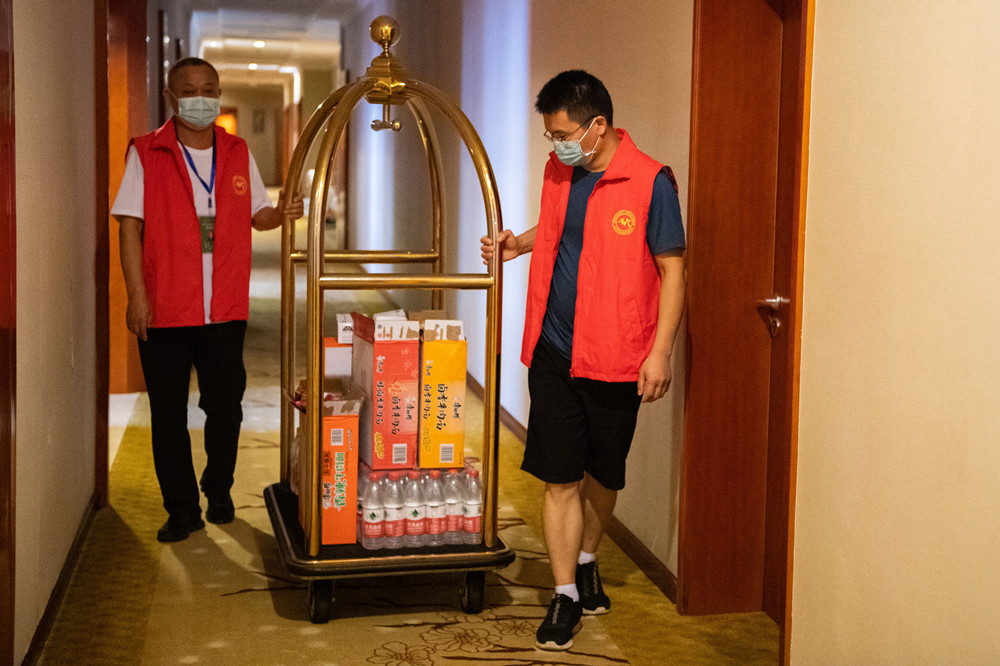Kind locals, gov't support tend 1,200 stranded tourists in virus-hit Zhangjiajie
From free hotels to interpreters, the popular tourist city of Zhangjiajie has rolled out a slew of services to assist stranded tourists amid a sudden COVID-19 onslaught on Aug. 10.
 More than 1,200 tourists are currently stranded in Zhangjiajie, said the city's culture and tourism bureau. The city on Aug. 3 asked all residents and tourists to stay local as part of the efforts to curb the latest COVID-19 resurgence.
More than 1,200 tourists are currently stranded in Zhangjiajie, said the city's culture and tourism bureau. The city on Aug. 3 asked all residents and tourists to stay local as part of the efforts to curb the latest COVID-19 resurgence.
Zhangjiajie, known for its pillar-like mountains, came to the spotlight after infected tourists linked to a cluster outbreak in east China's Nanjing visited here. This resulted in locals and travelers contracting the virus, who later traveled to other Chinese cities.
On Monday, the city reported six locally transmitted confirmed cases of COVID-19, raising its tally of such cases to 53 since July 29, while three asymptomatic carriers are currently under medical observation.
Reporters in the city said that the tourists are undergoing quarantine at 14 hotels. Their return trips are meanwhile under consideration, noted officials.
The city's headquarters of COVID-19 prevention and control said they set up a team to specifically serve the stranded tourists.
 Expenses involving hotel accommodation and dining during the tourists' prolonged stay will be borne by the city government, said Deng Jian, head of the culture and tourism bureau, adding that local community workers and volunteers are regularly delivering medical and other daily supplies.
Expenses involving hotel accommodation and dining during the tourists' prolonged stay will be borne by the city government, said Deng Jian, head of the culture and tourism bureau, adding that local community workers and volunteers are regularly delivering medical and other daily supplies.
The city has dispatched medical staff to conduct nucleic acid tests at the hotels. So far, all stranded tourists have undergone several rounds of nucleic acid testing, and none of the tests returned positive, he said.
Psychologists have also been stationed in each hotel to provide mental health counseling, according to the official.
"Because of long quarantine duration, some tourists are worried about their work, their families, and a second isolation after returning home," said Yuan Mouwen, deputy head of a local psychological association and a volunteer.
Yuan said as a psychological counselor, she has encouraged the hotel guests to speak out their concerns, communicate more and do some indoor exercises to soothe nerves. They also conveyed tourists' complaints to officials to help solve problems.
Shi Jiping, a stranded tourist from Shanghai, experienced an emotional roller coaster from anxiety to anger to cooperation.
Unable to adapt to the spicy local foods provided by the hotel, Shi lost his temper and had a row with hotel staff on the sixth day in quarantine.
Thanks to Yuan's mediation and volunteers who regularly brought him fruits and snacks, Shi restored calm and began to appreciate the kindness of the locals.
"We now understand the heavy workload at the front line of epidemic prevention and control," he said. "We're also impressed by the kind and patient Zhangjiajie locals and will surely visit here again in the future."
Shay Kearney from Australia is among the 17 foreign tourists undergoing quarantine in the Wulingyuan District. The local government there has hired interpreters to facilitate their communications.
Kearney said she understands that the government's strict quarantine rule is meant to curb the spread of the virus and is satisfied with the supply of daily necessities and anti-epidemic resources.
"We trust the Chinese government and feel safe staying here," she said.